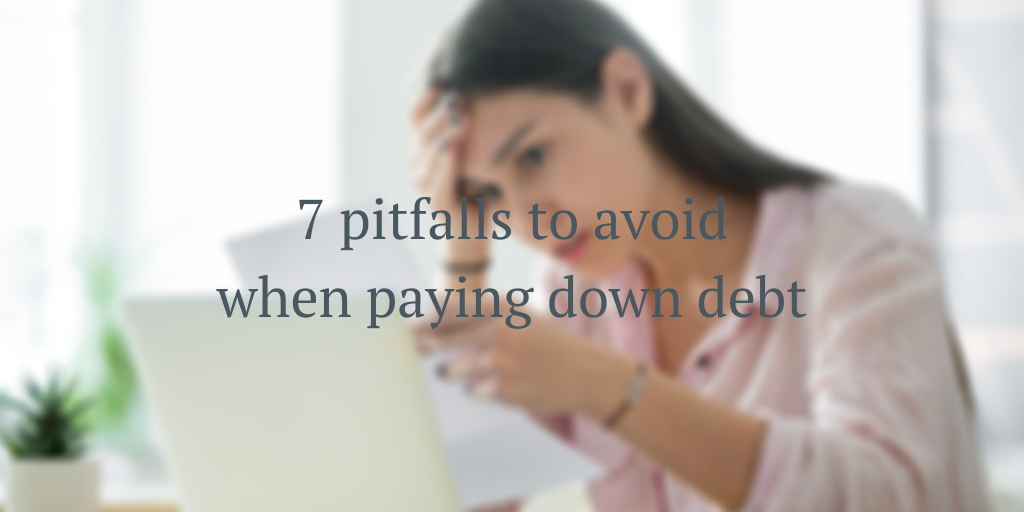
One of the biggest financial hurdles that people face is paying off debt.
In theory it seems simple enough but making it happen is another story. It’s one thing to say, “I want to be debt-free”. And a completely different one to actually pay off those debts. Is this something that you struggle with?
As a money coach, I see people falling victim to the same mistakes over and over and it’s likely you are probably guilty of one of these debt mistakes too.
That’s perfectly okay. You can learn and change your ways.
Now is the time to learn the common debt payoff mistakes so you’re able to pay off your debts quickly.
1. No Emergency Fund
The number one mistake when attempting to pay off debt is not setting money aside for the unexpected. In order to get ahead we must be prepared for the unexpected. It really is a case of not if it happens but when!
When money is tight, just about anything can send you into a tailspin. Every single day brings a risk that you will have to fork out money on those things that come out of the blue like car repairs, a visit to the vet or medical costs. Without an emergency fund, the only solution is to accumulate more debt, which leads to additional monthly payments and puts even more pressure on your finances.
Break this crazy cycle by setting up an emergency fund. It doesn’t matter how much (or how little) you save. Just start small and save regularly so that when the unexpected happens it won’t cause financial panic and you won’t have to borrow money.
2. Waiting for More Money
It’s common for people to delay paying off debt until they’re making more money.
I was guilty of this one. I thought I could clear my credit card debt once I made just a little bit more than I currently made. Guess what? It didn’t happen because every rise in my income led to an increase in my spending!
Making more money isn’t going to change your current debt situation.
So, regardless of your current income, start attacking your debt bit by bit. An extra $100 each month will take years off the debt payoff date and save you thousands in interest.
3. No End Goal in Mind
What is your reason for paying off debt?
For us, it was to go away on holidays every year and spend quality time as a family.
What is your reason?
After your debt is cleared, what do you want out of life? You’ve finally worked out how to pay off debt, so what do you plan to do with that extra money?
You need to recognise what that is to have long term success.
Paying off debt takes focus and dedication and you will have to make sacrifices along the way to pay off debt quickly. Having a purpose in mind, the thing that is fuelling you to pay off the debt, will help you stay on track and motivate you to keep going.
4. Never-ending Debt Cycle
This common mistake is why so many try to pay off debt and fail over and over again. The continuous debt cycle is brutal.
The debt cycle must be stopped if you want to be debt-free.
If not, then you pay off debt only to accumulate more debt in the process.
This is a good example of robbing Peter to pay Paul. If you are settling one debt whilst incurring another, you’re simply moving the debt around and continuing the debt cycle.
Stop using debt as a method of payment. Debt cannot be an option anymore. Put your credit cards in the freezer or better still, cut them up. If you want to charge your day-to-day expenses on your card, use a debit or cash card instead. Terminate this wicked debt cycle once and for all by not spending money you don’t have.
5. No Plan
If you want to be successful in ridding yourself of debt you need a plan. It really is as simple as this.
Throwing money willy-nilly at your debts is good. However, with a plan success happens much faster.
Make a list of all of your debts and sort them according to their outstanding balances and interest rates. Make sure you are always meeting the minimum monthly repayments on all of your debts. Then decide how much extra you can afford to pay each month and which debt to tackle first. It’s important to concentrate on one debt at a time.
There are a couple of approaches you can take:
Debt Avalanche Method: If you choose to pay extra on the debt with the highest interest rate, you’ll prevent yourself from incurring more interest charges. It will also shorten how much time it takes to pay off that debt.
Debt Snowball Method: Some people prefer to attack the debt with the lowest outstanding balance first. This will give you a quick win and a sense that you’re making progress which is a huge motivator to stick with it.
6. Unexpected Expenses
So many people tell me that they’re always set back by unexpected expenses. Things like new car tyres, school-related expenses, new prescription glasses, replacing the washing machine, etc. etc.
The truth is that these expenses aren’t really unexpected. They’re simply things we forget about. Oops!
To succeed with money, you must know where your money is going and have a plan for your money. This is true across all income levels.
Download the Personal Income and Expenses Worksheet I use with my clients. It includes every possible expense so you can be sure you’re not missing anything. Then start putting money aside for those expenses.
This way you’re taking control of what you can while you’re paying off debt. If something comes along that truly is “unexpected”, that is why your emergency fund is vital.
7. Zero Interest Credit Card Trap
No matter how you look at it, this is still debt until it is paid in full and it won’t magically disappear because it is interest-free.
Any one of these common debt mistakes can hold you back from becoming debt free. Honestly, more often than not, giving up on the debt is more likely.
Are you ready to stop making mistakes while paying off debt? Unsure where to start? How to figure it out?
I offer a Debt Buster Session where I use the information you provide about your debts to calculate the most efficient payment method to repay them as quickly as possible.
- You can choose the priority order of the debts you wish to focus on or go with the most efficient repayment combinations, giving you the maximum amount in saved interest and time taken to pay out the debts.
- You’ll get a detailed repayment schedule showing you exactly how much to pay off each debt every month and the dates your debts will be cleared.
If this sounds good to you, go ahead and book your session here.

